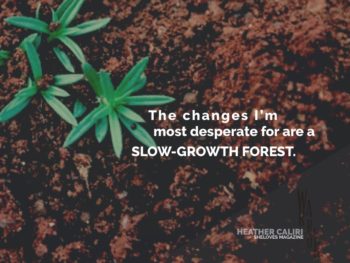This post might offend some people—especially at the beginning. Bear with me and read the whole thing, and then see if you are still offended.
This week’s project is getting a page of an old Bible dirty.
I knew it would make me nervous. I did not expect it to make me cry.
The easy part was deciding where to put the dirt: when Peter has the dream of all the unclean animals coming down from heaven, and hears God say, ““Do not call anything impure that God has made clean.”
But what kind of dirty would I get the page?
I’d assumed I’d go outside and rub it in earth. But as I thought about the Bible passage, I was in my bathroom, and I realized I was much more scared of bathroom dirt than outside dirt.
I was thinking toothpaste: specifically, the goopy crust that forms around the cap. And then I thought of the hair I’m always sweeping up, and the dust bunnies. And then, I gulped, and I thought about all the other unmentionables that happen in the bathroom.
I couldn’t put those in the Bible. Could I?
Suddenly, with clarity, I knew I needed to smear dirty dirty on the Bible. It felt a lot more risky and fraught than getting it dusty.
Fraught because I was afraid of what people would think.
But also because I don’t want to desecrate the Bible.
So I decided to start with dirty, not filthy. Capish?
I scraped off some brownish scum from the head of my toothbrush, and put it on the page. I wiped some of my daughter’s bright-red toothpaste on the page, and stuck some hair from the floor to it.
There was brown gunk on the inside of the kitchen sink, so I smeared that on. Some leftover ashes from cleaning out our fireplace.
And all of a sudden, I thought of the verse, ashes to ashes, dust to dust, and I realized that dirt was about bodies.
Bodies and death.
The smelly, noisy workings of our guts, and the processes of bacteria, and the frailty of our immune systems. The dust we sweep away is often formed of human skin cells, and our hair is shedding all the time.
As I scouted for dirt, I also realized that Jesus, sinless as he was, was likely unclean while he was on earth. Even if he followed the ritual purity laws well, he probably touched a dead body at some point, or had nocturnal emissions, or did something else to make him dirty.
Dirty is human.
And I started crying as I wiped filth on my Bible, because I realized that God loves our dirt, accepts it as part of our blessed bodies, gets down in the filth with us and takes us in his arms.
I stuck in a tissue of my tears in the Bible, for good measure.

After doing this project, I realized nothing I could do would truly desecrate God’s Word. No filth in this world cannot be redeemed. Or—at least—I didn’t think the ordinary, everyday, human filth we wallow in is something God is displeased with. No, as Christ said, we should worry more about the filth of our tongues and minds and hearts.
There is something tender and alive about dirtiness. I thank the God of all creation that He does not keep any of it at arm’s length.














 Trusting the Church After Abuse
Trusting the Church After Abuse